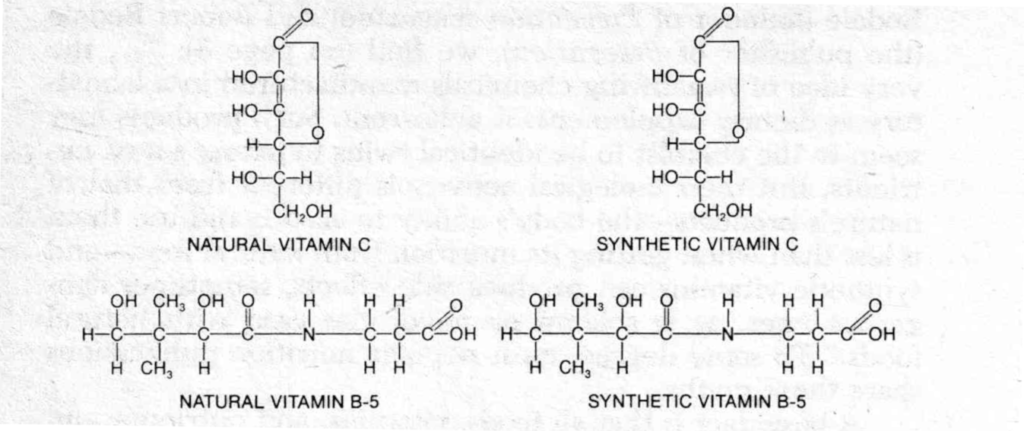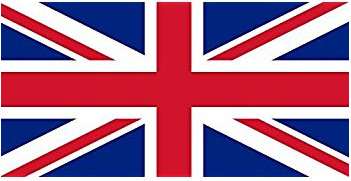
“A vitamin C is a vitamin C is a vitamin C.” A synthetic (made by a chemical factory) molecule of vitamin C is exactly the same as a natural (made by a plant’s biochemical factory) molecule of vitamin C. It is argued that there may be nutritional cofactors (some possibly unidentified) accompanying natural vitamins. It is true that there are known cofactors in natural vitamins, such as the bioflavonoids found with vitamin C. Bioflavonoids may be purchased separately from C, and if you wish to take significant quantities you’ll have to buy biolavonoid supplements because-the bioflavonoid content of natural C extracts is low. As for unidentified nutritional factors, why assume that such substances in natural vitamin extracts must necessarily be beneficialP We now know that
impurities in some natural vitamin extracts have undesirable properties.
For example, some people are allergic to pollen impurities in natural C. There is no pollen in synthetic C. Vitamin E extracted from cold-pressed wheat germ oil often contains enough natural estrogens (female sex hormones) that, when this type of E is taken in high doses, it can cause
testicular degeneration and loss of sex drive in some male animals and men. Megadoses of natural vitamin E of this type represents a vastly larger estrogen intake than that from eating beef raised on feed with DES (diethylstilbesterol) added to it. (A slice of natural whole-wheat bread contains more estrogens than a pound of DES-treated calves liver!) Yet you
don’t hear loud outcries against this type of natural vitamin E.
Natural vitamin E that is produced by vacuum distillation does not contain these undesirable estrogens. However, it is now so pure that there can be no advantage from any accompanying unknown cofactors, since they have been removed.
The choice between this type of natural E and synthetic E should be made strictly on the basis of price. Potatoes contain solanine, a natural poison. You probably eat enough solanine in a year to kill a horse if it ingested that amount all at once. Hence, megadoses of solanine containing natural potato extract should be avoided!
Just because vitamin-producing plants co-exist with us on the same planet doesn’t mean that the plants make the vitamins for our sakes. They have their own uses for the vitamins they make. Vitamins E and C, for example, in many seeds serve as lipid and membrane antioxidants (prevent damage
by uncontrolled reactions of oils and fats with oxygen).
The more oxidized the seed’s lipids and membranes, the less likely it is to germinate. And the estrogens in wheat are an evolutionary mechanism for limiting the reproduction of those animal species which eat wheat and the cereal grasses from which wheat was derived.
A wide variety of antioxidants are made by plants (many vitamins belong to this chemical class, including A, C, E, B- 1, B-5 [pantothenate], B-6, and PABA). These antioxidants have chemical names as long and complex as those of synthetic antioxidants. They function similarly, too. Using a wide variety of metabolic tests, Monsanto’s synthetic antioxidant ethoxyquin—which is not an exact copy of any known natural antioxidant—is able to replace dietary vitamin E in poultry (though not in people).
Synthetic vitamins are usually much less expensive than natural vitamins. If you are interested in taking large doses of certain vitamins and nutrients, you’ll find the cost differential very significant. In one study on the biological availability of synthetic versus natural vitamin C, synthetic C was found to be slightly more biologically usable by the body than natural C, which has membrane-binding factors to hold it in position for use by the plant from which it is extracted. Before you can make use of the plant’s vitamin C, you have to break down these structures binding the C.
Don’t worry about the reduced bioavailability of the “natural” or “organic” vitamin C you may have been purchasing. The “natural” or “organic” vitamin C that you purchase in a health food store is really over 99 percent synthetic vitamin C. There is so little vitamin C in rose hips, acerola ber-
ries, and other “natural” sources that C extracted from plants would cost over $1,000 per kilogram to manufacture. So why pay a lot of extra money for.a minute trace of C extracted from plants mixed with synthetic vitamin C?
A final word: There is nothing natural about taking five or ten grams of vitamin C a day, whether it’s natural or synthetic. You couldn’t possibly get that much C in a natural diet, even if you ate only fruit. Gorillas on a natural diet get only about three grams per day of vitamin C. In order to practice
life extension, you have to free yourself from the myth that nature is always good. Sometimes it is good. And sometimes it just makes you grow old.
Are you interested in life extension products?
mod4all ships all major brands of Modafinil from the UK
All products shipped from the UK by tracked post. We guarantee delivery.
We guarantee delivery, free reshipping.
Any questions at all about payments, shipping, etc. Anything at all, just email us.

Comments (0)